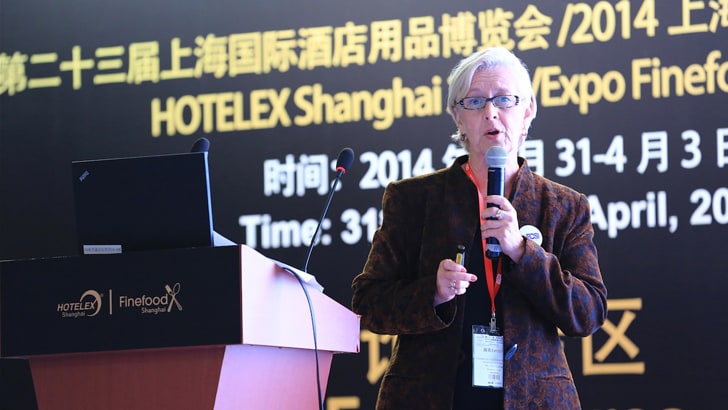
Shanghai’s HOTELEX expo is back for its 22nd year, attracting a record-breaking number of international exhibitors from the hospitality industry. The fair’s overseas exhibition area has grown to over 10,000 sq m, an increase of 42% from last year, in order to accommodate 1,500 exhibitors – the largest number in the show’s history.
Held at the Shanghai New International Expo Centre, the four-day event stretches over a whopping 140,000m², or 14 halls. Two extra outside halls have been added to contain this year’s footfall. The total number of visitors has not yet been counted but organisers expect it to exceed 80,000, the number who flocked last year.
Despite the recent severe cutbacks in China’s fine-dining sector, the mood on the floor was one of growth and optimism. Hotelex, a close partner of FCSI consultants since 2011, is expanding this year. When asked about plans to develop in second or third-tier cities in China, director of hotel and food division, Lu Meng Xiong said: “Our exhibition will not be limited to Shanghai, we plan to set foot in Chengdu, which is called the heaven country, this year. Using this professional exhibition as a platform we will develop the hotel and restaurant businesses into a higher level all over China.”
Visitors included around 500 international hotel mangers from high-end brands, such as InterContinental, Marriott and Sherwood; plus key figures from the domestic Chinese sector, such as Chengmei Hong, deputy director of Shanghai Municipal Tourism Bureau and officials from the China Tourism Hotel Association.
Leading the forum events were FCSI partners Toni Clarke, FCSI’s Asia Pacific division chair and world wide board director; and Clara Pi, FCSI, Asia Pacific division’s former chair and director. Their lively talks centered on developing strategies to overcome the economic downturn in HORECA industry (hotel, restaurant, café), and centralised food production, respectively.
Dealing with the downturn
Talk of the downturn in China’s high-end dining sector brought on by government limitations placed on corporate expenditure loomed large. In order to combat the effects Clarke advised learning lessons from the 2008 global financial crisis, which impacted the corporate sector in the West. “Managing a process of change delivers some of the biggest challenges in hospitality, the more used to change the organization is, the more flexible it will be in the economic downturn,” she said.
David Ng, CEO of Zhongqiang International F&B Alliance echoed the need to adapt in his talk on how foodservice chain operations can overcome recession.
Sustainability
The second big theme of this year’s conference was sustainability, innovation and green concepts. Organisers predicted a new round of competitiveness focusing on low-carbon management ideas within the hospitality industry. Richard Young, director of education at the America’s Food Service Technology Centre spoke of the benefits of sustainable practice for consultants.
Awards
This year’s show expanded into new territory by launching two brand new sectors, Bakery and Ice Cream and That’s Spirits Live Show. It also saw the return of themed sections on catering equipment, tableware, textile, appliances and amenities, IT and security, fitness and leisure, food and beverage, coffee and tea.
The new programme included live competitions and awards ceremonies. The12th China Barista Championship authorised by the World Barista Championship, showcased the cream of China’s coffee professionals. Meanwhile the China Bakery Master Championship featured over 100 contenders and their sugary masterpieces. For the list of winners and details of the China Latte Art Championship, 2014 China Gelato Championship and China Master Bartender Competition see www.hotelex.cn after the festival has finished.
Charlotte Middlehurst




